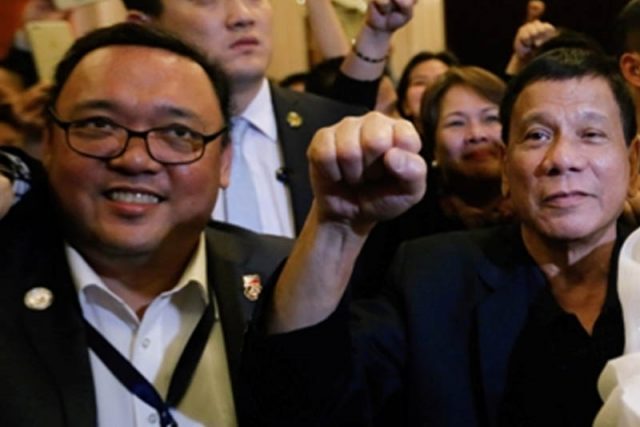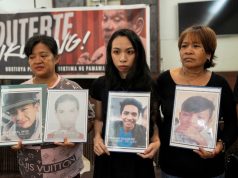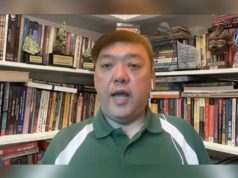MANILA, Philippines — Newly named presidential spokesman Harry Roque said Saturday, October 28, that he accepted the position “with the specific purpose of getting an audience with the President (Rodrigo Duterte) to address key human rights issues in the Philippines.”
“By taking this position, I hope to be able to advise the President directly regarding the manner and methods he has used to tackle the problem of drugs” and “have already expressed my willingness to serve as an adviser on the matter,” Roque said in a statement released just hours after Duterte made the post-midnight announcement during the Kabayan party-list representative’s birthday dinner in Davao City.
But opposition lawmakers greeted his appointment with skepticism.
See also:
Lagman debunks Roque’s prospective ‘advisory’ role
Albay Representative Edcel Lagman, one of a handful of opposition lawmakers in the House of Representatives, said Roque’s appointment “confirms his dubious role in defending the President’s wayward policies even as he is nominally a Deputy Minority Leader of the House of Representatives.”
“The charade is now over as Roque is liberated and obligated to be the President’s official apologist,” Lagman added.
Lagman said any spokesman for Duterte “has to be an expert mortician undertaking the post-mortem embellishment of the President’s crude and unfounded pronouncements and policies, and must be able to subdue one’s conscience in order to emote platitudes.”
“We wish Roque well in his job of justifying the unjustifiable and defending the indefensible pronouncements and policies of the President,” he added.
Even as he congratulated Roque Ifugao Representative Teddy Baguilat said: “As a self-proclaimed human rights advocate, I wish him luck in defending the horrendous human rights record of this administration.”
“The appointment also releases him from the challenge of masquerading as a minority leader,” he added.
The tiny House opposition has taken to calling itself the “independent” bloc to distinguish itself from the minority which, while traditionally populated by opposition lawmakers, is held by administration allies in the 17th Congress, among them Roque.
Roque, who Duterte said will enjoy the rank of secretary and be a member of the Cabinet, will replace current Duterte spokesman Ernesto Abella, who holds an undersecretary rank.
Before running for Congress last year, Roque made a name in human rights lawyering as founder of the Center for International Law. He was also active in several cases involving threats to press freedom, including acting as private prosecutor to a number of families of the 32 media workers who were among the 58 persons killed in the November 23, 2009 Ampatuan massacre.
The seeming disconnect between his past work and agreeing to speak for Duterte, who has been widely accused of encouraging extrajudicial killings in the course of his “war on drugs,” which is estimated to have claimed more than 13,000 lives and counting thus far, led former colleagues in an international network to ask him to “reconsider.”
“Many of us, your former colleagues, remember you as a fierce advocate for human rights,” the Bertha Justice Network, consisting of 16 groups, including CenterLaw, said in an open letter in which it accused Duterte of having “actively encouraged and condoned these human rights violations that we assess to constitute crimes against humanity.”
Roque, however, maintained that “by accepting this position, I am not condoning the violence surrounding the government’s anti-drug campaign, nor do I intend to further the same,” stressing that he continued to “value the right to life and dignity of every person and do not support the arbitrary killing of any person by the State.”
He explained that as a lawmaker his voice was “limited” since “politicians who relentlessly criticize the administration are simply ignored and labeled as ‘destabilizers’.”
He added that Duterte’s statements on human right, which “the administration has repeatedly clarified and reinterpreted,” were “what drew me towards the position of spokesperson.”
Roque said he aims to “refocus the attention of the people more towards the fundamental position of the State, and less towards the manner by which such has been declared” while, at the same time, “committing to reduce, if not totally eradicate, the impact of statements which appear to support genocide or violations of fundamental human rights.”
But Lagman said Roque had “minimized the grave import of the unabated extrajudicial killings related to the President’s deadly campaign against the drug menace; he voted for the confirmation of the declaration of martial law and its extension; and he did not vote against the reduction of the Commission on Human Rights budget to P1,000 and even called for a zero budget for the CHR.”
He also “failed to criticize Duterte’s predisposition to authoritarian rule and intention to declare a revolutionary government and he advocated for the creation of a panel to investigate the Ombudsman and recommend her impeachment for unwarranted and politically motivated reasons,” the Albay lawmaker added.










